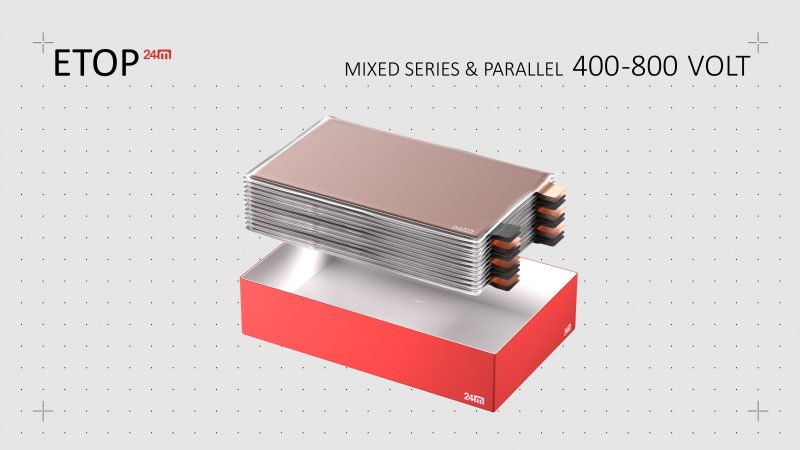24M Technologies, a pioneer in advanced battery design and manufacturing, has introduced 24M ETOP™ (Electrode-to-Pack), a breakthrough packing system that delivers unmatched energy density and can increase electric vehicle (EV) driving range by up to 50%.
Unlike conventional lithium-ion batteries, which rely on modules and packs made from individual cells, ETOP™ eliminates much of the inactive material—such as supporting metals and plastics—by sealing electrodes in thin polymer films and integrating them directly into the pack. The result is a lighter, more efficient battery that reduces cost, maximizes space, and significantly enhances performance.
24M ETOP replaces this approach by creating a sealed cathode/anode pair that eliminates the cell and module and unnecessary materials. This allows manufacturers to achieve the highest energy density for any chemistry (NMC, LFP, NCA, Sodium-ion, LTO, LiS, etc.) available at the pack level, because a higher percentage of the battery is electrodes, the energy-storing components.
In fact, 24M ETOP makes it possible for electrodes to comprise 80% of a pack’s volume, compared to the 30% to 60% of traditional battery packs. Crucially, this innovation also gives car makers a new choice: offer customers improved EV ranges by packing more energy into a same-sized pack or reduce EV costs by using less expensive chemistries.
For example, a 75kWh NMC (Nickel Manganese Cobalt) battery – the size and type used by many mid-sized electric vehicles – with 24M ETOP could be increased to over 100kWh using the same chemistry, increasing range by 33% all in the same sized pack. With 24M ETOP it becomes possible to swap NMC chemistry for less expensive LFP (lithium-iron phosphate) technology, resulting in a less costly pack, but with the same overall range.
24M ETOP also offers unprecedented design flexibility that enables completely customisable battery packs in different voltages and virtually any shape. OEMs and designers can create shapes such as ovals and hexagons, or whatever is best to fit within the space available. This pack efficiency translates into higher performance and lower costs.
There are major manufacturing benefits too. Because electrodes are sealed individually, electrode safety tolerances do not have to be as tight as in a traditional battery, improving yield and safety while reducing investment costs by eliminating the need for traditional high tolerance and precision equipment.
Because the sealed electrodes can be flipped, they can be connected in series and parallel arrangements, enabling anything from a compact, 48V battery, all the way up to a mixed series/parallel 400-800V pack, giving battery designers further freedom. 24M ETOP also enables cell formation to be done in series which can reduce formation equipment investment, one of the largest CAPEX items in today’s lithium-ion battery factories.
Naoki Ota, President and CEO at 24M Technologies said: “Minimising packaging materials and wasted space, 24M ETOP brings a step change in performance, replacing traditional cell-to-module-to-pack construction with electrode-to-pack construction, maximising energy density. 24M ETOP makes it easier to build compact, flexible and safe high voltage batteries, presenting a revolutionary opportunity for electric vehicle manufacturers – longer ranges with the same chemistry or the same range with lower cost, safer chemistries, both in the same space. It truly is the closest version of an ideal battery – it is essentially all active material in a sophisticated wrapper.”
24M ETOP can also be used with 24M’s Impervio separator, Eternalyte electrolyte, and its LiForever electrode, all of which are aimed at creating a fundamentally safer, higher performing and longer-lived battery through the reimagination of internal battery design.










